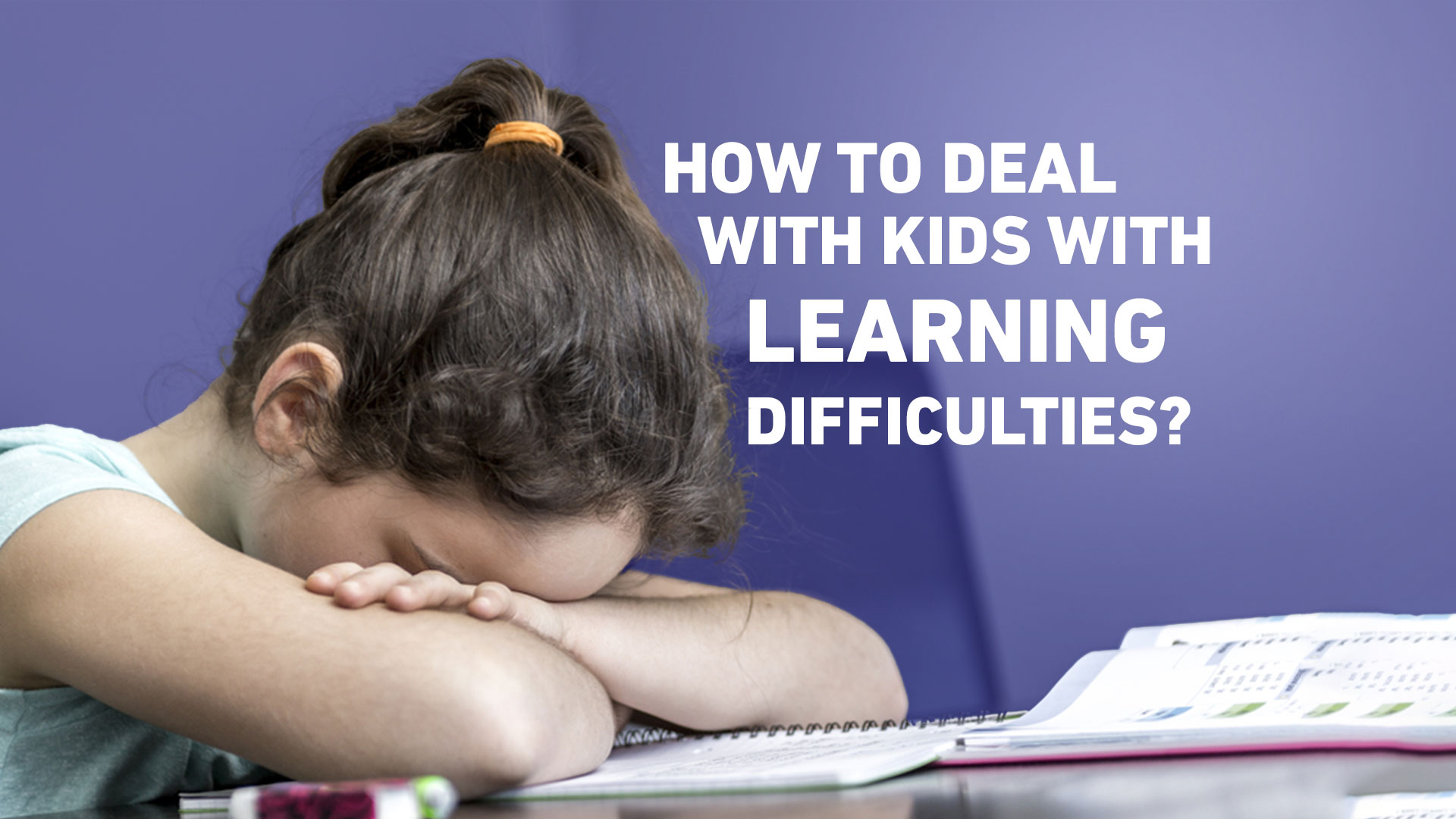
What are learning difficulties?
They are a set of conditions that affect the child’s ability to gain knowledge and skills at the same rate as his or her peers.
The Difference between Learning Difficulties and Learning Disability!
There have been numerous studies trying to separate learning difficulties from learning disabilities, as some of them considered that there is no difference; as both are caused by a physical malfunction in the brain. However, other researches confirmed that there is a slight differentiation.
In general, a learning disability constitutes a condition that affects learning and intelligence across all areas of life, whereas a learning difficulty constitutes a condition that creates an obstacle to a specific form of learning but does not affect the overall IQ of an individual.
A learning disability in most cases is permanent and continuous, as a result of a genetic defect or complications during birth that may affect all aspects of life.
As for learning difficulties, they are temporary. They could affect one or two skills, often within the academic environment, and do not have an extended impact on the daily life of the child.
In this article, we will try to focus on the learning difficulties that the child could be diagnosed with, and how to overcome the challenges that face the parents.
Symptoms of learning difficulties
The symptoms of learning disabilities are often recognized in a child at three different age stages:
Preschool (up to four years):
- Difficulty pronouncing words and sticking to the melody while singing or chanting, followed by difficulty in learning and memorizing the alphabets, colors and numbers.
- Troubles while holding some tools such as pen, cup and scissors!
- Inability to follow any particular routine, understand and follow directions.
Primary, middle and high school:
- Struggling in pronouncing letters and putting them into words and sentences.
- Spelling errors and misinterpretation of words.
- Difficulty comprehending basic math concepts, such as addition and subtraction!
- Delay in learning new skills!
- Avoid reading and writing, engaging in class discussions and expressing ideas.
- Bad handwriting.
Although these symptoms are a combination of all types of learning difficulties, with daily follow-up and consulting a specialist, parents will be able to determine the type of difficulty that dominates the child’s performance.
Causes of learning difficulties
- Heredity: If one or both parents have had a learning disability, are likely to develop the same disorder.
- Illness during and after birth: An illness or injury during or after birth may cause learning disabilities
- Stress during infancy: A stressful incident after birth such as high fever, head injury, or poor nutrition.
- Environment: Increased exposure to toxins such as lead (in paint, ceramics, toys, etc.)
- Comorbidity: Children with learning disabilities are at a higher-than-average risk for attention problems or disruptive behaviour disorders. Up to 25 per cent of children with reading disorder also have ADHD. Conversely, it is estimated that between 15 and 30 per cent of children diagnosed with ADHD have a learning disorder (according to whiteswanfoundation.org).
Classification of learning difficulties
Developmental difficulties:
- Attention.
- Concentration.
- Memorization.
- Perception.
- Handling problems.
These difficulties often appear in the pre-kindergarten stage, and are closely related to the second type, which is the “Academic Difficulties”
The Top 5 Most Common Academic Learning Disabilities & Their Symptoms
- Dyslexia
Dyslexia is probably the number one learning disorder in auditory processing, visual processing disorders may have trouble that affects children and adults. It’s a condition that makes it challenging to understand text or speech. If you have dyslexia, reading, writing, and speaking can be difficult and overwhelming.
Some symptoms of dyslexia include:
- Reversing the position of letters
- Struggling with reading comprehension load
- Delayed speech
- Difficulty learning auditory processing disorder new vocabulary or rhymes
- Having disorders with visual processing may have trouble understanding directions
- ADHD
Did you know that over 6 million children are diagnosed with paying Attention-Deficit/Hyperactivity Disorder (ADHD)? Many children with ADHD are disciplined for misbehaving, but they can’t control their actions. ADHD makes it difficult to concentrate, which can lead to one child distracting others around them in a classroom setting.
Some symptoms of ADHD are as follows:
- Unable to sit still.
- Being disorganized or forgetful.
- Difficulty staying quiet and attentive.
- Lack of motivation.
- Mood swings or emotional outbursts.
- Dyscalculia
Dyscalculia is more severe because it’s diagnosing a learning disability that makes it challenging to understand even the most basic math concepts. Since math builds upon itself, children with dyscalculia can fall behind and struggle to catch up for years.
Some symptoms of dyscalculia include:
Struggling with concepts such as measuring, time, and estimating
Being unsure of how to approach word math problems
Difficulty following the order of operations
Finding it challenging to count and group numbers together
- Dysgraphia
Dysgraphia is an affect learning disability that makes it hard to write legibly. Some people with dysgraphia struggle with spoken language to hold a writing utensil comfortably while others lack the spatial awareness needed to produce legible text.
Some symptoms of dysgraphia are as follows:
- Messy handwriting
- Taking a long time to write
- Holding a writing utensil improperly
- Struggling to express thoughts in a clear sentence structure
- Poor grammar
- Speaking out loud while writing
- Dyspraxia
Although dyspraxia is a condition that affects someone’s motor skills, it still has the potential to hinder affect specific learning. The reason why is because a person with dyspraxia may not be able to hold a pencil or participate by speaking regularly.
Dyspraxia mostly interferes with hand-eye coordination skills. Dyspraxia presents itself differently in each affects a person, but some symptoms include poor balance and struggling with fine-motor tasks.
Since these 5 common learning disabilities education affects such a large portion of children, all need to stay informed so we can learn to recognize the symptoms.
Learning disability treatment
It is very important to realize that treatment should be the result of the combined efforts of parents, school, family and friends:
- Early diagnosis is very vital for an immediate action to start the treatment and dealing with the problem, which is the task of parents in the first place, then kindergarten and then school, find out more here about the role of Rowad Al Khaleej International Schools in educating children of determination in its branches.
- Parents’ understanding, patience and deliberation to reach the best results in a short time.
- The child is enrolled in a special educational system under the supervision of qualified specialists to deal with his condition, and learn more about the branches of Rowad Al Khaleej International Schools For people of determination in Riyadh.
- The proper communication and coordination between parents and school.
- Consult a specialist, preferably an unchanged professional, to be familiar with the child’s condition – as each child is a unique case.
Tips for dealing with children with learning difficulties
- Dealing very carefully with the child and not bullying him, embarrassing him, or putting him under pressure in any way.
- Make sure to share it with those of his age and close to his peers, and not leave him alone.
- Explain his condition to the family and relatives so that they can participate in the treatment process, and thus make the child feel accepted by those surrounding him.
- Show your love and appreciation by gifts, appreciation and praise.
- Celebrate any slight progress he makes, and the small victories he achieves, no matter how small.
- Talk to him in a friendly way about his condition. You might need to talk to a child therapist to know the best way you can say it.
- Play with him and spend quality time for entertainment and fun.
- Self-restraint – as much as possible – if he does not adhere to or listen to instructions.
- Give him enough time to respond, answer, or make decisions.
- Appoint a specialized teacher in his case – if possible- for help and guidance.
- Buy toys and educational materials that suit his condition – they are available in the market.
- Make an effort to befriend a child with special needs.
Rowad Al Khaleej Schools Provides Career Advice Center
Rowad Al Khaleej Schools for Special Education provides a set of consultations under the supervision of the Ministry of Education, the Special Education Department, to support families who take care of children of determination, to contribute positively to the academic progression of the Saudi society.
